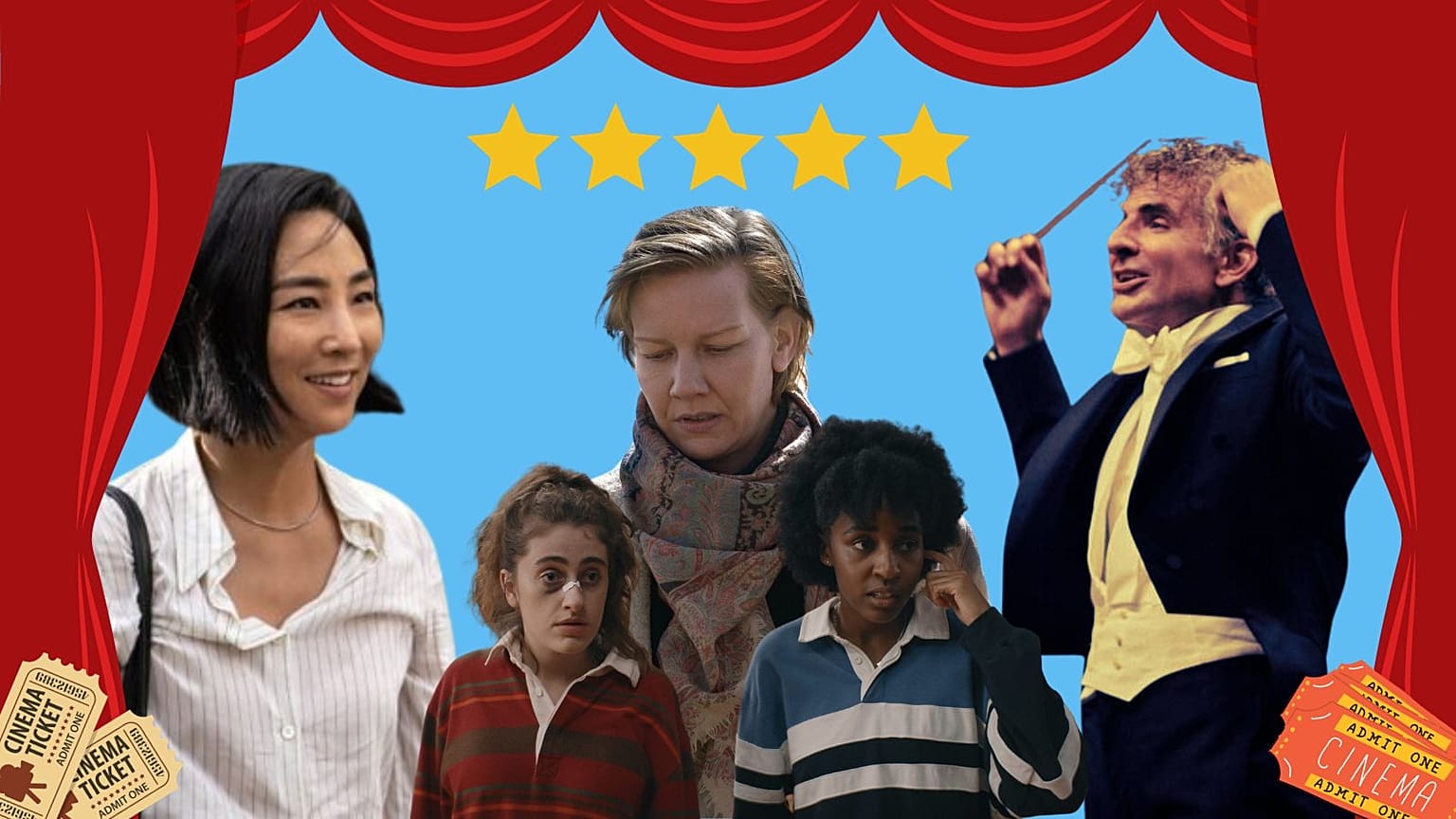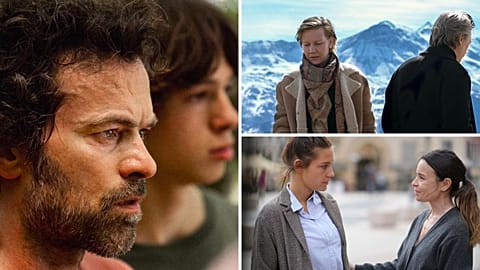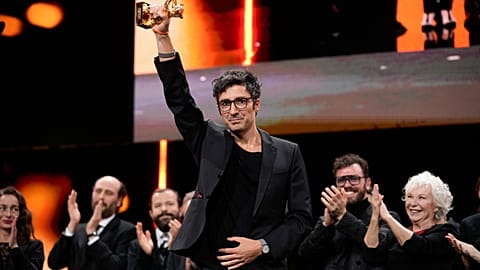These are our favourite movies of the year. How many have you seen?
That’s a wrap for 2023 at the talkies…
 ADVERTISEMENT
ADVERTISEMENT
 ADVERTISEMENT
ADVERTISEMENT
It didn’t limit itself to the behemoth of Barbenheimer or the dwindling fortunes of Marvel and the now calcified sense of superhero fatigue, as 2023 truly had something to offer everyone.
The following list is hardly a definitive ranking, simply because no year of moviegoing can be reduced to a simple Top 20 - and nor should it be. However, these are the movies that followed us home after the screenings and lodged themselves in our minds. And hearts. And bottoms.
More on that later.
What you’ll read below is the result of some hard - and mostly democratic - choices from the part of the Euronews Culture team. We’ve made some tough choices, and kept to the rule that the films need to have been released in European territories this year.
This means that the likes of Poor Things, The Zone of Interest, Green Border, Priscilla and many more were not eligible for 2023, as most are released in theatres and online next year. Had they been included, you can be sure they would have ranked very high – and stay tuned to this parish for our Most Anticipated Films of 2024, in which these titles will make an appearance.
So, without further ado, our countdown to the best film of the year begins with...
20) The Old Oak
Ken Loach ends his triptych of social justice movies with The Old Oak. The 87-year-old Loach retired in 2014 before returning when the Conservative Party were elected again in 2015. I, Daniel Blake, his searing film about the inhumanity of Britain’s benefits system, won him his second Palme d’Or. Sorry We Missed You again showed the desolation of the north-west of England and the exploitation of companies like Amazon. For The Old Oak, Loach turns his interrogatory gaze onto the politicisation of refugees. Yara (Ebla Mari) is one of many Syrian refugees moved into a dilapidated ex-mining community in Durham. She receives a hostile reception as many of the locals resent the opportunities afforded her family while theirs struggle. Pub landlord TJ Ballantyne (Dave Turner) becomes friends with Yara and the pair organise a soup kitchen for the whole community. The point of Loach’s film is clear. The White British locals resentful of the Syrian refugees are all so frustratingly close to seeing the real enemy isn’t those fleeing war but the politicians who’ve neglected their community. To Loach fans, this might be obvious, but it’s a markedly true portrayal of how politics informs these conversations. Of his trio, The Old Oak has the most on-the-nose dialogue and the schmaltziest all-coming-together message at the end. The octogenarian filmmaker can be forgiven for that final indiscretion. If it’s his last film, he deserves to end on a hopeful note. Jonny Walfisz
19) Rye Lane
This is one of the most charming, utterly delightful hidden gems of the year. Rye Lane, the walk-and-talk romcom directed by newcomer Raine Allen Miller, is London’s version of Before Sunrise. Two strangers, both navigating recent breakups, have a chance encounter and spend a day together. What follows is a vibrant, witty and stylish journey through the streets of South London, perfectly capturing the feel of the city and the chaos that defines life in your 20s. The chemistry between the two young leads (David Jonsson and Vivian Oparah) is exceptional, and they are accompanied by a hilarious supporting cast of unique and eccentric characters. Not to mention a brilliant cameo from a little-known actor named Colin Firth… Rye Lane is a true cinematic bear hug. Theo Farrant
18) Beau Is Afraid
A24 – the studio behind Academy Award winners Moonlight and Everything Everywhere All at Once – swung big this year… and missed. Their most expensive film to date, Ari Aster’s third film (after Hereditary and Midsommar) cost $35 million, is over three hours-long, and was a complete box-office bomb. Critics (including our very own David Mouriquand) felt it was overlong, overwrought, and overblown. I loved it. The psychodramatic epic follows Joaquin Phoenix as Beau Wasserman, a stunted nervous wreck of a man on a treacherous journey to visit his mother for the anniversary of his father’s death. The Odyssean chapters Beau endures to reach his mother are best enjoyed (or endured) through the guise of an Oedipal fever dream. Out of the door goes plotting; in comes nightmare logic. The first chapter is probably the most effective, as Beau experiences agoraphobic anxiety as he tries to leave his home besieged by an ultraviolet apocalyptic version of America. The next chapter has Amy Ryan and Nathan Lane as his kindly-if-oppressive carers. He escapes that to find himself in a dream sequence spurred on by a forest-dwelling acting troupe. We’re not even halfway at this point. I’ve not even had a chance to bring up the phallic monster that unsubtly growls the subtext at Beau. I’ll cut to the chase – something Aster’s film doesn’t. Not everything works in Beau Is Afraid. But that’s the result of Aster swinging with such brazen confidence, and I can’t help but appreciate it. Too many films play things safe, and this is the antithesis of that trend. Long, indulgent, and pretentious, yes. Hilarious, gross, mystifying, magnetic, intriguing, and terrifying? Absolutely. JW
17) How to Have Sex
The rites-of-passage holiday is a trope we’ve seen countless times, usually in comedies such as The Inbetweeners and Kevin & Perry Go Large, where the protagonists tend to be young men getting messed up on fish bowls and doing degrading acts while trying desperately to get laid. Molly Manning Walker takes a fresh, female look at this experience with her brilliant debut, How to Have Sex. Three teenage girls arrive in Malia, nabbing a pool-facing apartment where they scream excitedly and chuck cigarettes in a frying pan to dry them out. After meeting a group of boys, Tara (a spectacular performance from Mia McKenna-Bruce) loses her virginity to one of them and the film becomes an intimate exploration of identity, sex and consent. Reminiscent of Charlotte Wells’ wonderful Aftersun, Manning Walker takes a traditional British holiday setting and unravels its sunny superficialities, detailing her characters’ intricate underlying emotions and capturing with tenderness their unspoken truths. There’s a particular loneliness to being a young woman navigating the world that How to Have Sex perfectly portrays, rites-of-passage shenanigans sunburnt by emotional trauma. Amber Bryce
16) You Hurt My Feelings
If I’m looking for a comfort film, I will always reach out for my favourite microgenre: New York intellectuals struggle in love. An off-shoot of the romcom genre, paved by Woody Allen and Nora Ephron, You Hurt My Feelings is the latest edition to the trope and it hits in all the best ways. Julia Louis-Dreyfus is Beth, a writer who overhears her husband Don (Tobias Menzies) telling her brother-in-law he doesn’t like her latest book. What’s so great about writer-director Nicole Holofcener’s film is that the schism – necessary in any romcom – isn’t about a silly misunderstanding that could be easily managed by effective communication. Instead, Don, a therapist whose middling sessions we get snippets of, is an effective communicator with Louis Dreyfus’s wonderfully expressive Beth and both are still as madly in love with each other as when they first met. As said in the title, we just get to see how this intelligent, funny and loveable couple navigate the complexities of genuinely hurting each other’s feelings. While other films on this list will dazzle with special effects or devastating emotional turmoil, You Hurt My Feelings is a joyous exploration of life and love in an ordinary (highly intellectual, witty and beautiful New Yorker) couple. JW
15) The Holdovers
Few films this year have the distinction of legitimately vying for future holiday classic status, and Alexander Payne’s The Holdovers ticks all the boxes. Taking place in 1970 over winter break at an elite New England boarding school, a handful of “snarling Visigoths” - including a rebellious pupil (Dominic Sessa) - are forced to stay stranded in school during the Christmas holidays. They will be supervised by a pedantic classics teacher (Paul Giamatti) and the school cook (Da’Vine Joy Randolph), who is about to spend her first Christmas without her son, who was killed in combat in Vietnam. Melancholic and consistently funny, this film is surprising in its simplicity. And despite the retro look - with a stunning soft edged 35mm photography which works wonders - this movie is more than a just nostalgia-fueled, Dead Poets Society throwback. It’s a warm cardigan of a movie, certainly, but it never shies away from a palpable sadness - which is for the best, as all good Christmas movies need to have a certain undercurrent of despair. Its heartfelt moments ring true and never topple into saccharine territory, preferring instead to build up to a sweet character study about misfits trying to find a common language. Giamatti, who reunites with Payne nearly two decades since Sideways, is well matched by Sessa and Joy Randolph, and the trio who make sure that, like their characters, the film thrives on all fronts. It’s acerbic, profound, and compassionate, a true return to form for Payne after the disappointing Downsizing andarriving precisely 10 years since his superb Nebraska. David Mouriquand
14) Talk To Me
This is why I never liked throwing house parties. Either your mum’s collection of precious teddy bear ornaments get smashed, or some malevolent spirit turns up via a party game involving a mummified medium’s hand and all hell breaks loose. The latter nightmare is the premise of Australian indie horror Talk To Me, directed by brothers Danny and Michael Philippou, previously known for their popular film spoofs on YouTube. Here’s how it works: A candle is lit, you’re strapped to a chair, hold a disembodied hand and say: “Talk to me”. This summons a spirit – not a pleasant one – that you can “let in” for a quick shot of possession. Mia (Sophie Wilde), a young woman still processing the death of her mother, decides to take part, drawn in by her peers sharing clips to social media (#possessioncore). It’s all fun and games – until it isn’t, and these sassy underworldlings decide they’d like to stick around. The film’s authentic portrayal of teenagers and sharp psychological focus set it apart from the bland Blumhouse jump scares we’re so used to seeing in mainstream horror. The scares are slick and genuinely spine-tingling, strengthened by a textured storyline that makes us actually care about the characters and breathes excitement into this much maligned genre. But next time we’re at a house party, we’re sticking to the spirits in red cups. AB
13) Scrapper
It’s impossible not to be charmed by Scrapper, a short and ever so sweet piece of British cinema, marking the directional debut of Charlotte Regan. The film offers a vibrant, imaginative and heartfelt exploration of loss and grief, as a young girl is reconnected with her estranged father following the loss of her mother. Newcomer Lola Campbell delivers a ferociously cheeky breakout performance as Georgie, giving the ever reliable Harris Dickinson, who plays her father, a run for his money! The film is gorgeously shot by Molly Manning Walker (whose own directional debut, How to Have Sex, also made our list), drawing parallels to films like The Florida Project and Aftersun with its sun-kissed pastel colour palette. A combination of a fantastic script, clever, off-beat filmmaking techniques and charismatic performances make Scrapper one of the year’s very best. TF
12) The Killer
Fincher is back, baby! While Nolan, Scorsese and Ridley Scott were off chasing Oscars with their epic biopics this year, the genius behind Se7en instead said, ‘I think I’ll just make a fun, arthouse-style, assassin revenge flick for Netflix’. The Killer is as ruthless as it is ridiculous. Michael Fassbender delivers an outstanding performance as our anti-hero, a neurotic, cold-blooded hitman reminiscent of Patrick Bateman, who like Fincher in his own filmmaking, is methodical to the point of obsession. The audience is granted access to the hitman’s psyche through his bizarre internal monologues as he deals with the violent consequences of a botched high-profile job in Paris. True to Fincher form, the film exudes grit and stylistic precision, yet it maintains a playful absurdity with deadpan humour interspersed throughout. It also has what might be the greatest action sequence of the year. Apologies to John Wick. TF
11) Theatre Camp & Bottoms: The Return of the American Comedy Double-Bill
The American Comedy was back in full force this year with not one but two stellar offerings: Theatre Camp and Bottoms.
The first is a brilliant mockumentary from directors Molly Gordon and Nick Lieberman, which centres on a summer getaway for drama kids which is losing its direction and funding. The intensely devoted staff need to train the passionately self-involved kids for their big summer production, while attempting to save the institution that makes their lives worth living – as both students and teachers share a deep, deep desire for performance. “This will break you,” one tells the children before rehearsals. “This will fully destroy you.” The same could be said for the audience when it comes to laughter, as the film fizzles with the same energy as Best in Show and packs in so many great gags in the short space of 90 minutes that it’s hard to know when the laughter ended from the previous joke and where it began for the next one-liner. With this laugh rate and some dazzling showtunes to boot, Theatre Camp would have been the funniest comedy of the year... had it not been for Bottoms.
Also starring Ayo Edebiri - who had a banner year with these two films, the TV hit The Bear and Spider-Man: Across The Spider-Verse - Bottoms is Emma Seligman’s follow up to 2018’s terrific Shiva Baby. It follows two gay BFF high-schoolers (Edebiri and the brilliant Rachel Sennott) who are desperate to lose their virginity before college. So far, so American Pie, but this is a far more riotous, irreverently feminist, and bloody affair. The two besties decide to start an all-female fight club in the name of empowerment, following an altercation with the jockiest of all jocks. The real reason? They want to get the attention of the girls of their dreams. And “coochie.” From the moment a loudspeaker summons the “ugly untalented gays” to the principal’s office, the jokes come thick and fast – some even committing to unhinged surrealism towards the end. As wet-yourself-funny as it is though, there’s a perfectly judged use of teen coming-of-age tropes, and Bottoms never lets a good laugh get in the way of some sincere emotion, with its characters feeling empowering but also, and crucially, endearingly human. Comparable to the very best teen dramas (Heathers, Clueless, Mean Girls), as well as the cult queer film But I’m A Cheerleader, Bottoms is a future cult classic that has it all – including some of the best needle drops courtesy of Charli XCX, Avril Lavigne, King Princess and Bonnie Tyler. Moreover, it’s genuinely refreshing to watch an LGBTQ+ story that doesn’t limit itself to a box-ticking exercise, and focused something else than closeted love, trauma and disapproving parents. Bottoms is out, proud, messy, horny, and very, VERY funny. DM
10) Vincent Doit Mourir (Vincent Must Die)
Most of us have, at some point, wanted to hit a co-worker in the face with a laptop. Unfortunately for Vincent (Karim Leklou), a mild-mannered graphic designer living in Lyon, he’s the recipient of this very act after a lowly paid intern suddenly loses his cool. Then another co-worker repeatedly stabs him with a pen. HR are about as helpful as you can imagine, but it doesn’t take long for Vincent to realise that this isn’t just a workplace issue – EVERYONE inexplicably wants to hurt – no, actually kill him. Even five seconds of eye contact with a stranger is enough to provoke a vicious attack, a deeply unsettling premise that will only serve to reinforce avoidance behaviours in those of us with social anxiety. This striking debut feature from French director Stéphan Castang blends genres to create a paranoia-fuelled horror/thriller/love story that feels unexpectedly original despite being inspired by genre greats such as George A. Romero and John Carpenter. You’ll find yourself contemplating what you’d do in such a situation for hours afterwards, and being careful not to look anyone in the eye. AB
Check out our exclusive interview with Stéphan Castang.
9) Les filles d'Olfa (Four Daughters)
An overlooked film of 2023 was this bold and unique film that confronts motherhood and the topic of religious fundamentalism. Kaouther Ben Hania’s stirring Les filles d’Olfa (Four Daughters) is a formally daring docu-fiction hybrid which examines the disappearance and radicalization of two Tunisian girls through both dramatic re-enactments and interviews with the real-life subjects. Refusing to deal with absolutes and clichéd representations, Ben Hania allows for layered portrayals of generational clashes and transference of trauma, as well as the reality that love and resentment can intertwine in family environments. Beyond this emotional setting, Four Daughters tells the wider story of Tunisia, how the 2011 Revolution has affected countless lives, and how the weight of entrenched patriarchal structures remains designed to perpetuate the societal oppression of women. It’s by utilizing a hybridized approach through a decidedly Brechtian lens that Ben Hania provides less an exorcism of the past but an opportunity to embrace a necessary exhumation of pain. Four Daughters is an incredibly powerful and often unexpectedly playful story of knotty maternal love and extremism, one that achieves a level of empowerment without forsaking a sense of guarded optimism. DM
Check out our exclusive interview with Kaouther Ben Hania.
8) Maestro
All eyes were on Maestro at the Venice Film Festival this year - Bradley Cooper’s second directorial effort after his stunning A Star Is Born in 2018 (which also premiered on the Lido). After all, Venice had prior form when it comes to conductors, having premiered Tár last year – one of Euronews Culture's favourite films of 2022. Surely it couldn’t live up to the high watermark left by Cate Blanchett? Well, it did - albeit in a very different way. It’s all the more impressive knowing that both Scorsese and Spielberg had a crack at this long-gestating Leonard Bernstein biopic before Cooper got his talented mitts on it. What the actor-director has achieved is a stylish, intimate and moving tribute to an artist and a family, as well as the confirmation that he’s is the real deal just as much behind the camera as he is in front. He’s not alone, as Maestro is just as much Bernstein’s story as it is his wife’s, Felicia Montealegre, played to perfection by Carey Mulligan. Through her eyes, Maestro manages to dodge the typically sanitized, cradle-to-grave biopic formula. It’s note-perfect, and if there’s any justice, both Cooper and Mulligan will be frontrunners when it comes to Oscar season next year. DM
7) Anatomy of a Fall
A man falls to his death outside a remote cabin in the Alps. There are no witnesses. Only his wife was in the house, who insists he must have fallen. Anatomy of a Fall is Justine Triet’s Palme d’Or winning courtroom drama of the cross-examination of Sandra Voyter (Sandra Hüller) as she defends herself against the charge of homicide. Voyter, like Hüller, is German, and spends much of the film speaking in either French or English as she struggles to be understood by the French court. Themes of alienation, mistranslation, and lost-meanings run through the film as Voyter attempts to communicate the depths of a marriage that is syphoned through the prism of a legal system. Besides a brief flashback to an argument between the couple, we spend precious little time with Voyter and her late husband. The ultimate events leading up to his death remain a mystery throughout the entire film. But this isn’t a whodunnit. The film asks if either the prosecution or the defence could ever truly evoke the truth of Voyter’s real relationship when stripping it down to two-dimensional elements such as a therapist’s testimony or a recorded argument. Triet and co-writer Arthur Harari’s script is an outstanding interrogation, but the film is truly sold on Hüller’s implacable and ambiguous central performance that leaves you questioning whether you can truly know anything learnt second hand. JW
Check out our exclusive interview with Sandra Hüller.
6) Barbie & Oppenheimer: The Barbenhemer Double-Bill
Barbie. Oppenheimer. Barbenheimer. It would only be right to put these two films together on our list. It was the cinematic event of the year. Never before had cinema seen such an epic clash as the one witnessed between Greta Gerwig’s live-action Barbie movie and Christopher Nolan’s historical biopic based on the life of J. Robert Oppenheimer. Two polar opposite films released on the same day. The feeling of seeing such large audiences attending the cinema, all appropriately dressed and ready for a double-billed movie experience, was surreal. And remarkably, both films were excellent in their own ways. Barbie with its incredible cast and candy-coloured exuberance, not only delivered on all the playful silliness you’d expect, but also poignantly redefined the symbol of Barbie in 2023, delivering a powerful message of empowerment. Meanwhile, Oppenheimer emerged as a monumental achievement in filmmaking - a heart-pounding, grand-scale character study that stands among Nolan’s best works.
Together, these two films marked a triumph for original filmmaking in an era dominated by lazy remakes and tired superhero prequels. TF
5) Perfect Days
Over the past decade, veteran German filmmaker Wim Wenders (Wings of Desire, Buena Vista Social Club) has had a somewhat erratic output, with his last great film being the 2011 documentary Pina. This year, he took a lifetime of wisdom and distilled it into one of his best narrative features in years, a quietly captivating gem about cherishing fleeting moments and embracing random connections. Perfect Days began life as a project commissioned by Japanese urban authorities, to celebrate Tokyo's state-of-the-art public toilet system. Wenders does offer the Western viewer the opportunity to be astonished by the variety and designs of the Japanese facilities, but has strayed from the brief. In doing so, he’s created an observational character study that’s shot with a documentarian’s eye by Franz Lusting. Central to the potency of this deeply empathetic film is Kōji Yakusho’s portrayal of Hirayama, a solitary and diligent toilet cleaner in Tokyo. Armed with only a handful lines, he manages to gracefully convey a wealth of emotions behind an impassive façade. He breaks your heart and puts it back together again with a delicate potency, and to say that his win at this year’s Cannes Film Festival for Best Actor was merited is putting it mildly. When you add the fact that the whole beguiling affair is soundtracked to the sounds of Patti Smith, Nina Simone, and – predictably, considering the title - Lou Reed, and you’ve got a stunning work about finding the lyrical in the quotidian. We could all use a bit more of that right now. DM
Check out our exclusive interview with Wim Wenders.
4) May December
Director Todd Haynes (Carol, Velvet Goldmine) came back this year with one of his most playful and disquieting films yet. Years after embarking on a scandalous age-gap affair, a couple (Julianne Moore and Charles Melton) rakes up the past when an actress (Natalie Portman) arrives to research a film based on their lives. Initially, the meetings between the three are supposed to be mutually beneficial. However, behind sweet smiles and polite behaviour lurks something more uncomfortable. Loosely based on the ’90s tabloid scandal of Mary Kay Letourneau, who at age 35 served a prison sentence for rape when her sexual relationship with a 12-year-old boy was made public, May December is an audacious and skilful satire that’s self-aware in all the right places. Haynes works from a stellar script by Samy Burch, and explores the nature of acting and artifice – both personal and cinematic. The filmmaker deftly navigates a risky tone throughout; at once a thorny psychological drama and a droll black comedy that borders on cringe telenovela, May December has all the elements of a dark-edged Brian De Palma movie, mixed with a playful undercurrent of intentional campness. It will keep you guessing, and rather thrillingly, considering this is where it could have faltered as a story that centres on the possibility of emotional and sexual grooming, the film’s wry humour never betrays the complexity of the narrative and its Bergmanesque psychological strands. It's a provocative gambit which massively pays off, largely thanks to sensational performances from Moore, Portman and Melton. They assure through their layered performances that May December credits the audience with a level of intelligence - one which allows them to recognize that something complex need not be packaged in what they’d expect. DM
3) La Passion de Dodin Bouffant (The Taste of Things) & Menus-Plaisirs - Les Troisgros: The Foodie Double-Bill
The way to an audience’s hearts is through their stomachs, and two magnificent films this year knew it all too well. Indeed, if you thought that the likes of Babette’s Feast, Tampopo or Ratatouille were cinematic food porn to get you salivating, Vietnamese-French director Trần Anh Hùng’s La Passion de Dodin Bouffant (The Taste of Things) and American documentary legend Frederick Wiseman’s Menus-Plaisirs - Les Troisgros put French cooking in the spotlight - and the results were mouthwatering feasts.
The first course won its filmmaker the Best Director award at Cannes this year, and it’s not hard to see why. Adapted from 1924's “La vie et la passion de Dodin-Bouffant, Gourmet” (“The Life and Passion of Dodin-Bouffant, Gourmet”) by novelist and gastronomic writer Marcel Rouff, this French foodie romance is swoon-worthy period piece that depicts the professional and personal relationships between a gourmet (Benoît Magimel) and his key cook (Juliette Binoche) in and out of the kitchen. It leaves a gorgeous after-taste. A lot of time is spent on extended sequences of gourmands in the kitchen making marvels to make Auguste Escoffier blush. It’s all filmed beautifully, bathed in warm light and with a camera lightly floating through the cooking processes. However, beyond all its transfixing visual and auditory delights, it’s an elegant and heartfelt story about life and what makes it worth living. Bravo.
The second course could very well be the most mesmerizing thing you see all year. Like all serious meals, it’s a lengthy affair, clocking in at 4 hours. But fear not – you won’t see the time pass. It chronicles the behind-the-scenes at a three-Michelin-star restaurant Les Troisgros in Roanne, France, touring the culinary empire and showing you what gets cut out of all the countless cooking shows on offer. In fact, this film is very much the antidote to those shows: no mean-spirited hysterics, no throwing of utensils, no slave-driving... Instead, we get the sourcing of ingredients, the thought process behind the dishes, the exacting prep, the tasting, the serving, and the choices required to make an institution work. Everything required to make ephemeral works of art. And at 93, with seven decades of filmmaking behind him, Wiseman reminds you why he truly is the grand master of documentaries with this film. His subjects have often been American institutions and social systems; Menus-Plaisirs audaciously deals with not one but two intertwined structures - the restaurant, and the multigenerational dynasty of chefs that run it. The end result, while perhaps not up there with his late career masterpiece Ex Libris – The New York Public Library, is nonetheless a contemplative tour de force that has a truly life-affirming quality. It may very well be one of the greatest food films of all time. It certainly works wonders as a double-bill with The Taste of Things. Just make sure you watch both on a full stomach. DM
Stay tuned to Euronews Culture for our exclusive interview with Frederick Wiseman.
2) Tótem
One of the joys of attending film festivals is landing on that one gem that will stick with you for the rest of the year, a film so beautiful and impactful that will seep into the marrow of your bones. This happened to me at this year’s Berlinale, with Lila Avilés’ Tótem. While Nicolas Philibert’s documentary On The Adamant ultimately won the Golden Bear, nothing this year came close to what the Mexican writer-director achieved. She creates an intimate yet bustling ensemble piece, the action of which spans a single day, as seen through the gaze of a seven-year-old girl, Sol (Naíma Sentíés). It begins in a bathroom, where Sol and her mother Lucia (Iazua Larios) are getting ready for a family gathering. Their exuberance and joyful connection takes a sudden turn when the young girl reveals her wish for the big day: “For Daddy not to die.” It’s a thematically rich piece that appears small due to the confined interiors it navigates, but its scope and heart are huge. Avilés manages to compassionately convey how children comprehend the world of adults beyond what they’re given credit for, especially when it comes to the co-existing forces of life and death. Tótem stuck with me all year, and was a true revelation. Seek it out and always remember that the best films of the year are often the ones that don’t generate headlines or get the wide distribution they deserve. Don't let this one slip through the cracks. DM
1) Past Lives
I went to see Past Lives with a broken heart. The death of a connection makes you feel, momentarily, absent from the world; all the what-ifs a never-ending mumblecore directed by the mind. It’s at such times we need cinema most, to escape into another life and make some small sense of our emotions. Celine Song’s award-winning debut film helped me to do just that; a semi-autobiographical story of two childhood friends, Hae Sung (Teo Yoo) and Nora (Greta Lee), who reconnect later in life after Nora’s family moves from South Korea to Toronto, Canada. Most striking are Song’s gently profound observations of human relationships and the ways in which our bonds shape us, even as they wither and warp to time. Inspired by the idea of “In-yun”, a Korean spiritual belief that our encounters are linked to interactions from our past lives, the film beautifully depicts the silent inner worlds of its characters, which sometimes spark together then slip away with the tug of reality. Any sadness is also soul-soothing, a reminder that the ephemerality of connection is what gives it such meaning – and gives us a sense of peace when we let go of what might have been. AB
There we have it.
What, no Suzume, Pearl, Afire, Spider-Man: Across the Spider-Verse, or Polite Society?
Like we said at the beginning of the article, tough choices were made. These films did, however, make it onto our mid-year ranking Best Films of 2023... So Far article, which you can check out here.
Did we miss anything?
Let us know, and stay tuned to Euronews Culture for more 2023 Best Ofs. Including our Best Albums of 2023, and our look ahead to the films we’ve already seen and that you shouldn’t miss in 2024.

















